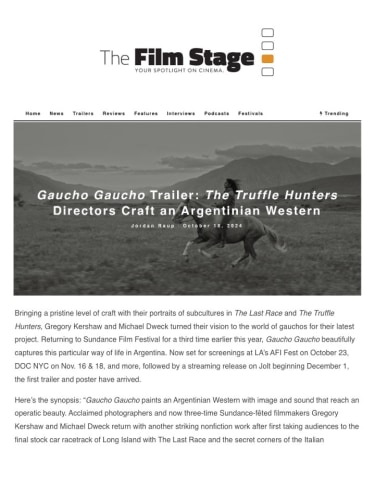Gaucho Gaucho Trailer: The Truffle Hunters Directors Craft an Argentinian Western
The Film Stage
10/18/2024
Back
by Jordan Raup
Bringing a pristine level of craft with their portraits of subcultures in The Last Race and The Truffle Hunters, Gregory Kershaw and Michael Dweck turned their vision to the world of gauchos for their latest project. Returning to Sundance Film Festival for a third time earlier this year, Gaucho Gaucho beautifully captures this particular way of life in Argentina. Now set for screenings at LA’s AFI Fest on October 23, DOC NYC on Nov. 16 & 18, and more, followed by a streaming release on Jolt beginning December 1, the first trailer and poster have arrived.
Here’s the synopsis: “Gaucho Gaucho paints an Argentinian Western with image and sound that reach an operatic beauty. Acclaimed photographers and now three-time Sundance-fêted filmmakers Gregory Kershaw and Michael Dweck return with another striking nonfiction work after first taking audiences to the final stock car racetrack of Long Island with The Last Race and the secret corners of the Italian countryside in search of white truffles with The Truffle Hunters. Their focus is now on the vast mountains of Argentina, expressed in stunning black-and-white photography, and a small community of gauchos who hold profound connections to the surrounding nature and their own traditions. As older generations dispense their wisdom, the film keeps its eye toward a new generation who continue to fight for their families’ legacy in a modern world.”
Jose Solís said in his Sundance review, “The black-and-white cinematography brings out unexpected beauty and contributes to the sense that we’re watching timeless figures––ghosts, even. Because these ghosts remain within the confines of their culture by choice, they interact with modern beings in a limited way. A gaucho hat on a head stands out almost comically in the middle of a school classroom; it’s even more surprising to discover it’s not a boy but a girl, Guada, who listens attentively to her teacher’s reminder that she is supposed to wear her uniform to school. The girl replies she is a gaucho and feels more comfortable in her traditional attire. Throughout the film we learn Guada is also defying the norm at home by taking part in traditions usually reserved for men.”